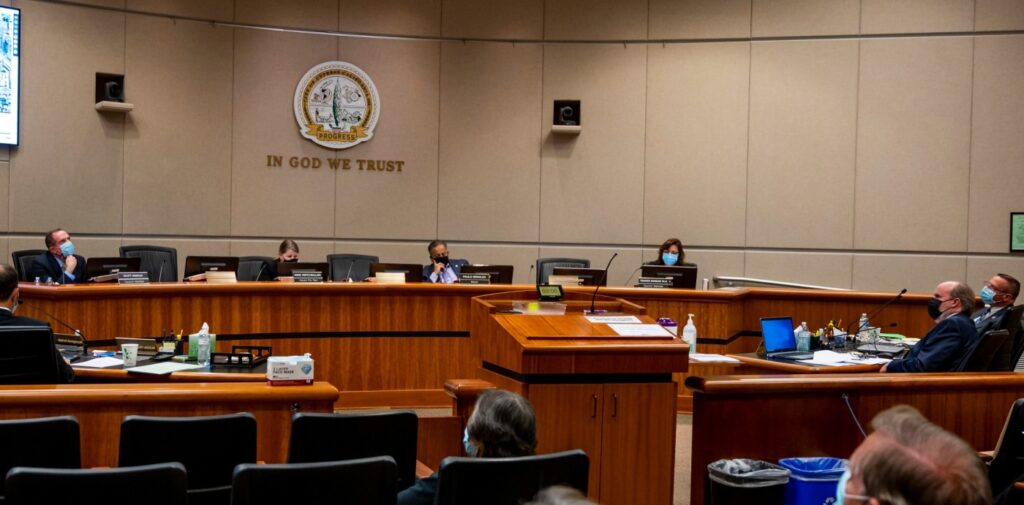
Cypress City Attorney Fred Galante defended the city council’s recent decision to vote in closed session to reject a push toward district-style elections, a move that some experts said bypassed state laws protecting open governance.
“I can confidently say this council did not violate the Brown Act,” Galante said at the city council meeting held Monday, March 28.
Also known as the Sunshine Law, the California Brown Act requires most local governance to be conducted in plain view.
On March 14, after investing $40,000 in a series of public workshops aimed at educating residents about the question of at-large elections or district-style elections, the council voted 4-1 to ignore a legal demand that Cypress switch to district elections.
The California Voting Rights Act (CVRA) favors district elections – by which voters choose representatives within precincts. Districts can make it easier for minority and lower-income candidates to win spots in elections for city council, school boards, water districts and similar offices.
Many cities and other voting areas of Southern California have switched to district elections, typically after being threatened with lawsuits that allege minorities in those cities have not been represented in local government. Cypress, where about 35% of the population is Asian but the city council has no Asian-American members, is facing the possibility of such a lawsuit.
Fighting claims involving the CVRA can be costly. For instance, Anaheim spent $1.1 million and Palmdale $4.7 million before eventually conceding to district-style elections. Most cities and school districts switch to precincts rather than risk a huge bill.
Some residents complained that this month’s unexpected vote against district elections felt rushed. It even took by surprise the city’s paid consultant, whose just-completed opinion poll was yet to be published online.
But Galante said that Cypress “set a very high bar for transparency” with its community forums. He added that provisions in the Brown Act “specifically allow a council to meet in closed session when there’s a threat of litigation.”
The Brown Act permits city officials to conduct confidential discussions regarding legal matters, such as contract disputes and personal injuries, away from public scrutiny. But a debate over how residents vote arguably falls into grayer area.
And, generally, officials in other cities have cast votes about whether or not to switch to district-style elections in public meetings rather than in closed sessions, where the public can’t listen in on each elected official’s rationale.
“This is something that literally impacts every voter,” said Tustin City Councilwoman Letitia Clark, who was the city’s mayor during a public vote last year to go by-district.
David Loy, legal director for government watchdog First Amendment Coalition, questioned the legality of the Cypress City Council’s closed-session vote. “Exceptions to transparency (in the Brown Act) must be narrowly construed,” he said.
But in an interview, Galante differentiated between voting for and and voting against, saying the latter can be done in closed session.
“Most cities that voted in open session made the decision to actually switch to districts,” he said. “Cypress did nothing more than reject a demand letter.”
Asked how those cities could have known in advance which way the vote would fall, Galante observed that council members likely first discussed the topic in closed-session meetings. “You can see where the council is going and if that decision needs to be made in open session,” he said.
However, Galante added, “I can understand how some people would like to hear what each council member thought.”
Cypress Councilwoman Frances Marquez cast the one dissenting vote.
While most city councils and school district boards in Orange County have held their CVRA votes in public, Cypress is not the first to go another direction. Last year, the Irvine City Council also decided in closed session against converting to district elections.
“We directed our City Attorney to write a letter in response, pointing out the errors in the demand letter,” said Councilman Anthony Kuo. “Irvine already is an integrated city. We have not heard anything back.”
Cypress resident Katie Shapiro said that she and other residents are weighing whether they will attempt to force a do-over by alleging that the closed-session vote breached the Brown Act.
“We just want to know, ‘What is your thinking process?’” Shapiro said. “We feel like we are talking to a brick wall.”
